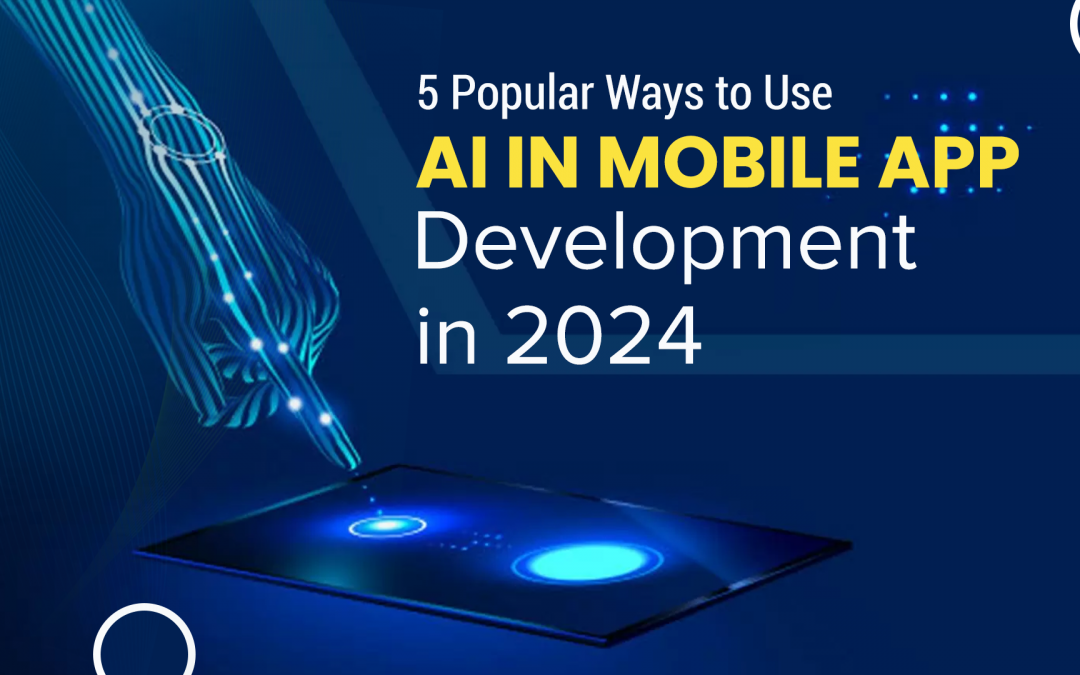How often do smartphone users retain a new app on their mobiles? Look at these statistics.
The average retention rate for Android apps is nearly 22.6% on day one, 6.5% on one week, and 2.6% on one month after download. Besides, out of 80 apps installed on the average smartphone, only 38% are used every month. That means about 50% of apps remain untouched most of the time.
To minimize the churn rate, mobile app development companies are now integrating modern technologies like artificial intelligence. AI in mobile app development offers enhanced functionalities and delivers more personalized experiences. Similarly, the technology significantly expands the functionality of mobile apps and improves retention rates.
This article discusses the four most popular ways companies can use artificial intelligence to make their mobile apps more valuable in 2024.
Let’s get started.
What is Artificial Intelligence?
Artificial intelligence is a game-changer in the tech industry. The technology leverages machine learning models to make devices smarter, more powerful, and more intelligent. AI-powered machines can mimic the human mind and perform complicated tasks that require problem-solving capabilities.
There are several forms of artificial intelligence. However, generative AI has made significant progress in recent years. It can produce high-quality content like text, images, and videos based on textual prompts.
ChatGPT is a very good example of a generative AI tool. It enables users to write long-form essays, emails, or engaging captions in seconds. Similarly, DALL-E and Firefly can create engaging images from text meeting users’ requirements.
Moreover, OpenAI will soon release Sora, a next-generation text-to-video tool powered by advanced generative AI technology. It would enable users to generate realistic videos or extend their length based on textual prompts. The world’s first AI software engineer Devin is also making headlines nowadays.
Popular Ways to Use AI in Mobile App Development
Refer to these five best ways to use AI in mobile app development and take user experiences to the next level with this revolutionary technology:
Personalized Recommendations
The one-size-fit-all is a famous concept, but it is not applicable in the mobile apps sector. Instead, users nowadays want customized mobile apps that can be personalized per their preferences.
Imagine you’re using a fitness app to lose weight. This app cannot share the same fitness plan with all its users. The plan has to be customized according to individual users to get perfect results. AI can do this.
By integrating AI into mobile app development, you can receive personalized recommendations. The recommendations are based on data the app collects about your unique preferences and behavior. It tracks what you like or hate the most, what is your smartphone usage frequency, and what apps or websites you often interact with.
For example, Netflix and YouTube recommend videos based on users’ interests and viewing history. Their AI-powered algorithms track search titles, genres, actors, and categories to deliver personalized experiences.
Automating Repetitive Tasks
Repetitive tasks are very time-consuming. By automating these tasks, you can save your time and focus on more critical areas like business growth and client sourcing.
The advent of artificial intelligence has opened new doors to automation. Companies are using AI in mobile app development to revolutionize the app’s productivity and efficiency. AI-powered automation enables users to complete their tasks quickly. They can automate repetitive tasks and spend time searching for new opportunities.
For example, HR managers can use AI-powered workforce management software to create upcoming schedules automatically based on the previous history. Similarly, AI chatbots can respond to clients’ queries and streamline customer support.
Predictive Analytics
Can you predict the estimated period required to complete a project? Well, making accurate predictions is not easy. But, AI can help you in this regard.
Nowadays, many companies have developed AI-powered mobile apps that can accurately predict future needs. Users can use these predictions to make smart decisions and stay ahead. They can even forecast future trends and predictions based on historical data.
A popular use of AI-powered predictive analytics is in weather forecasting apps. AI makes them smart and allows users to get more accurate insights. This way, AI transforms apps into finely tuned prediction platforms with surprising accuracy.
Conversational Interfaces
You must be familiar with Apple’s Siri. It takes your voice command, recognizes it, and performs the desired action. This feature is now being enabled in mobile apps, thanks to artificial intelligence.
There has been a sharp rise in AI-powered voice assistants with recent developments in natural language processing. Mobile apps are now replacing text boxes and complex menu bars with easy-to-use conversational interfaces. Users can interact with apps naturally and get things done without navigating through the traditional interface.
Conversational interfaces are very useful for users with visual impairments. They can use this feature to use the app’s functionalities and get a personalized charm. The app can guide users based on simple voice commands, act as a virtual assistant, and offer 24/7 customer service.
Final Thoughts
Mobile app development is a competitive sector. Every day, millions of new mobile apps are uploaded to the Play Store and App Store. Yet, only a few of them are retained by users for longer periods.
There are several reasons behind high churn rates in mobile apps. The most prominent one is bad user experience. App development companies have been using different strategies to address this problem. Common strategies include improvements in the app’s interface, customization options, and regular updates.
In today’s era of AI transformation, no system is complete with the integration of artificial intelligence. This revolutionary technology makes simple mobile apps more intelligent, smarter, and efficient. Users can get personalized recommendations based on their interests and boost their productivity with AI-powered mobile apps.
Hence, AI in mobile app development is currently the top trend. In the coming years, we will see more breakthroughs and advancements to shape users’ experiences.

